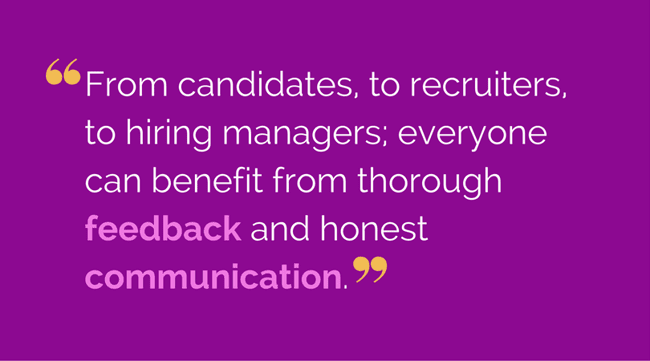
Where Feedback Comes From
Feedback from Recruiters
When searching for a job, going through a recruiter can be a great option. Utilizing a recruiter will help with the job search process as well as give a great outlet to receive feedback. The recruiter will review a candidate’s resume and give feedback on whether or not anything needs to be changed or updated. They will also give advice on what hiring managers are looking for in a resume for a specific role. When a candidate goes into a meeting with a recruiter, they should act as though it is an interview. This will help prepare for a potential interview as well as allow the recruiter to give feedback on answers and body language.
Feedback from Hiring Managers
When working with a recruiter, most of the communication with the hiring managers will be done through the recruiter. A recruiter will review a candidate’s resume with the hiring managers and discuss possible next steps. Recruiters can also talk with the hiring manager about which candidates would fit the company well. The recruiter can then provide feedback from this discussion and prepare the candidate for a possible interview. Even if the hiring manager does not want to move on in the hiring process, the candidate will be able to learn from their feedback.
Feedback from Candidates
Candidates can also give feedback, starting with writing a good thank you note after the interview. Thank the hiring manager and any other employees for taking the time to do the interview. This small act will take only a few minutes but will speak volumes to the interviewees. When talking with the recruiter after the interview, candidates can also give them feedback on how the interview went from their own perspective and review any takeaways.
How Hiring Managers, Recruiters, and Job Seekers Can Work Together on Feedback
Recruiters Receive Feedback about a Hiring Manager’s Ideal Candidate
Before the hiring process even begins, it’s imperative for recruiters and hiring managers to go over what they are looking for in an ideal candidate. They know better than anyone else what the ideal candidate looks like for the position they are filling and the atmosphere of their organization. Hiring managers should clearly communicate with the recruiter what they are looking for and what they are not looking for. After interviews, hiring managers also need to discuss with the recruiter about whether or not they are sending the type of candidates that would best fit the position. Recruiters will then be able to go over everything and see what needs to be changed.
Hiring Managers and Recruiters Give Feedback from an Interview
Hiring managers and recruiters should want to make the hiring process efficient and effective for everyone, and communication is crucial here. After the interview with the candidate, hiring managers should contact the recruiter promptly to let them know how it went. Give them accurate feedback, whether it is good or bad. If the hiring manager is upfront and honest about what they think about a potential candidate, this will assist both the recruiter and the candidate more. Lastly, the recruiter needs to discuss the feedback in depth with the candidate in order to determine the next steps in the hiring process.
Recruiters Receive Feedback from the Candidate about an Interview
Recruiters can also let the hiring manager know what the candidate thought about the interview. Candidates can inform them about what they are seeing regarding the organization’s culture and branding. This can only help the hiring manager and the organization as a whole improve the hiring process.
What to Do With Feedback
Listen
Not everyone loves listening to people telling them what they should change. A part of the job hunting process is growing, and growing comes from feedback. Feedback can be positive and negative, and all sides of the hiring process need to listen. Listen to the feedback and be open to what is being given. It is an excellent opportunity to have someone from the outside give advice and praise about what you are doing.
Prioritize
Take the feedback you have received and prioritize it. Learn about the essential things that need to be fixed or worked on and organize them. Write down everything received from your feedback (good and bad) and then go through them again to make a list of what needs to be done first. This will help to get on the right track to where improvements need to be made.
Act
Once you have listened to the feedback and prioritized what needs to be done, now is the time to act. Whether it’s fixing items on a resume, refining communication with an organization, or making adjustments to the interview process, it’s time to start making these improvements which will benefit the entire hiring process.

Want more information that will help you to succeed in your job search or career? Subscribe to our blog below and receive the latest career advice!
